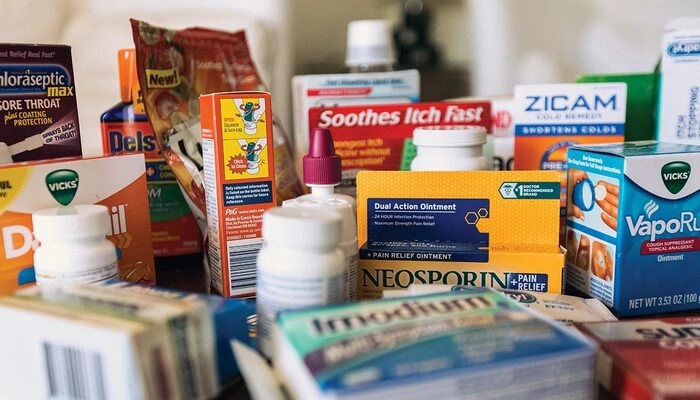
A pharmacist has revealed some of the biggest over-the-counter (OTC) ‘scam’ medications found in U.S. pharmacies. Dr. Grant Harting, a licensed pharmacist identified five common drugs that are either overpriced or ineffective. Sleep aids, allergy medications, and even memory supplements made the list. Dr. Harting also shared better and more affordable alternatives to these products.
An Expensive Sleep Aid
ZzzQuil, a popular OTC sleep aid from the makers of DayQuil and NyQuil, tops the list. The active ingredient in ZzzQuil is diphenhydramine, an antihistamine typically used for treating allergies. While effective for inducing sleep, Dr. Harting points out that ZzzQuil is essentially an antihistamine mixed with alcohol—and it’s overpriced at $12 a bottle.
“It’s not really a scam because it works,” Dr. Harting said, “but cheaper alternatives are available. Dollar Tree versions of diphenhydramine are far more cost-effective.”
The Mayo Clinic advises against regular use of antihistamine sleep aids like ZzzQuil. Over time, the brain becomes reliant on them, making it harder to fall asleep naturally. Furthermore, side effects such as dizziness, dry mouth, headaches, and constipation can occur.
Colace: A Misleading Laxative
Dr. Harting warns against Colace, a laxative containing docusate, which is marketed to soften stool and relieve occasional constipation. However, a 2021 study in the American Journal of Gastroenterology reviewed seven studies on docusate and found no evidence that it’s more effective than a placebo.
“It’s a misconception that docusate helps with hard stool,” Dr. Harting explained. He recommends fiber supplements containing psyllium husk instead. Brands like Metamucil and Benefiber offer plant-based solutions that are more effective in addressing constipation.
Mucinex: A Cough Remedy That Falls Short
Mucinex, which contains guaifenesin as its active ingredient, claims to thin mucus and help clear congestion. However, Dr. Harting criticized it as a “racket.” He cited a recent study that found no significant difference between guaifenesin and a placebo in reducing cough symptoms.
“This just isn’t helpful for breaking up mucus in the lungs,” he said. Instead, Dr. Harting recommends a saline nebulizer, which requires a prescription, or generic liquid decongestants, which are more soothing and effective.
Sudafed: Useless Phenylephrine
Sudafed, an OTC medication for colds and congestion, uses phenylephrine as its active ingredient. However, a recent FDA review revealed that phenylephrine is no more effective than a placebo. Once metabolized in the gut, it fails to reach the bloodstream in sufficient levels to provide any relief.
The FDA has called for the removal of phenylephrine-based Sudafed from drugstore shelves. Dr. Harting called it “complete trash” and suggested using prescription-only Sudafed, which contains pseudoephedrine. However, he cautioned that pseudoephedrine can cause high blood pressure in some people.
FBR Launches Fee-Less Customs Assessment System in Karachi
Prevagen: A Memory Supplement Fraud
Prevagen claims to improve memory and cognition, but it’s one of the most expensive scams on the list. A bottle can cost between $40 and $70, depending on the capsule count. In 2017, the Federal Trade Commission (FTC) and New York State Attorney General sued Prevagen’s marketers for false advertising. They labeled its memory-improvement claims as “clear-cut fraud.”
Dr. Harting did not mince words: “Prevagen is a scam, full stop. It just doesn’t do anything.”
Better Alternatives to Common OTC Scams
For each of the medications labeled as scams, Dr. Harting offered affordable and effective alternatives:
- ZzzQuil: Opt for generic diphenhydramine from stores like Dollar Tree. Avoid regular use to prevent dependence.
- Colace: Use psyllium husk-based fiber supplements such as Metamucil or Benefiber.
- Mucinex: Try a saline nebulizer (with a prescription) or generic liquid decongestants.
- Sudafed: Use prescription-only Sudafed with pseudoephedrine but monitor for high blood pressure.
- Prevagen: There is no proven OTC supplement for memory improvement. Focus on a healthy diet, exercise, and mental stimulation.
Be an Informed Consumer
Many OTC medications rely on strong marketing but fail to deliver on their promises. As Dr. Harting’s analysis shows, even widely available drugs can be overpriced or ineffective. Always read labels, research ingredients, and consult with a pharmacist or healthcare provider before buying.
By choosing affordable and proven alternatives, you can save money while ensuring effective treatment. Avoid falling for the hype and make informed decisions about your health.
Follow Day News on Google News, Instagram, YouTube, Facebook, Whats App, and TikTok for latest updates















